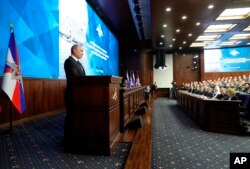The United States will step up research in hypersonic offense and defense weapons, in response to a Russian test of a nuclear-capable hypersonic glider.
"While the United States has been the world leader in hypersonic system research for many decades, we did not choose to weaponize it," Defense Department spokeswoman Lt. Col. Michelle Baldanza told VOA. "Those who have decided to weaponize hypersonics are creating a war-fighting asymmetry that we must address."
Russian President Vladimir Putin, who oversaw the test Wednesday, said the weapon is impossible to intercept and will ensure Russia's security for decades to come.
He called it an "excellent New Year's gift to the nation.''
The weapon, dubbed Avangard, detaches itself from a rocket after being launched and glides back to earth at speeds faster than the speed of sound.
"The Avangard is invulnerable to intercept by any existing and prospective missile defense means of the potential adversary," Putin said after the test.
He said the weapon will become part of Russia's Strategic Missile Forces next year.
The Pentagon has been aware of Russian weapons advances for some time. In March, Putin bragged about having an array of new strategic nuclear weapons that can hit a target anywhere in the world. At the time, White House press secretary Sarah Huckabee Sanders said Putin had only "confirmed what the United States government has known all along."
Baldanza said the U.S. will now increase focus on hypersonic weapons. "We are pursuing options for weapons delivered from land, sea and air to hold at risk high value, heavily defended and time critical targets at relevant ranges so that we can ensure our ability to dominate the battlefield by 2028."
The test comes at a time of heightened tensions between Moscow and Washington over the allegations of Russian meddling in the 2016 U.S. presidential election, conflict in Ukraine, and the war in Syria.
National Security Correspondent Jeff Seldin contributed to this report.






